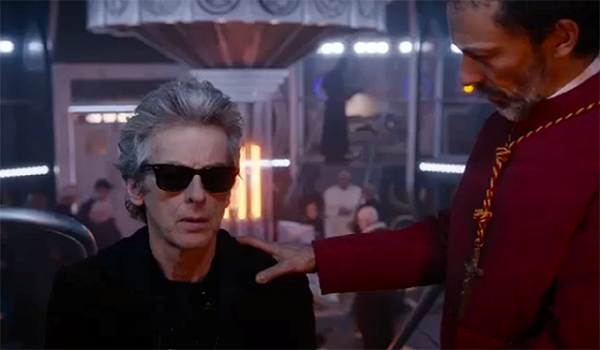Just when you think Doctor Who can’t get any better.
Continuing on from the conclusion of “Oxygen” The Twelfth Doctor is now blind and powerless when suddenly he receives a mysterious message on his Sonic Sunglasses titled Extremis. Things move along as the Time Lord gets a surprise visit from The Pope, adding in a nice new flavour to the mix as The Twelfth Doctor is called into an age old mystery passed down from the Holy Churches, to which even The Pope himself fears and wishes to understand. It is said that those who read the Veritas ultimately take their own lives in fear of the truth that has been revealed to them. Without hesitation (despite being blind) The Twelfth Doctor accepts this daring mission.
The episode then goes a little cold as The Twelfth Doctor refuses to tell Bill the truth about his blindness, to which Nardole (played by Matt Lucas) deciphers it’s because the Time Lord doesn’t want to accept the reality of his current predicament, thus telling Bill would further that truth. Another neat factor to “Extremis” (like with “Oxygen”) is that Nardole once again has a more frontal role within the narrative. Lucas really feels at home being The Twelfth Doctor’s assistant, as well as continuing his role of being the adult in the room in order to try and keep the Time Lord in check.
With The Twelfth Doctor blind it’s sort of up to Nardole to help him out with the basics, though the Time Lord is able to partially see via his Sonic Sunglasses. This results in some funny moments of Nardole having to read out things to The Twelfth Doctor (who obviously can’t see anything) whilst trying to allude the fact that he’s now blind from the likes of the Vatican and Bill (often leading to Nardole being rather sarcastic). What’s more, you do get the sense (like I’ve mentioned before) that Nardole feels quite equal to The Twelfth Doctor, adding in a different kind of dynamic between the Time Lord and his companion.
I suppose it also helps with differentiating Bill and Nardole’s characters, with Bill acting as the more traditional companion, whilst Nardole performs a more sophisticated assistant role (similar to K-9, only with less John Leeson charm and more Matt Lucas mischief). Once more we see Nardole and Bill interact and start to share a great bond onscreen, allowing Nardole to fit more nicely into the bigger picture as his presence feels more necessary and less just because.
I also really enjoyed the fact that Nardole took his glasses off and went all badass on Bill in order to put her in her place about the importance of him protecting her (under the Twelfth Doctor’s instructions) to which Bill actually respected him for. This was made all the better by Nardole admitting there’s no secret to him being genuine badass.
Meanwhile, we have Peter Capaldi really giving some of his best work as The Twelfth Doctor (in his blind state) tries to remain in control of each situation he is in. He attempts to read the Veritas (after craftily sending Bill and Nardole away) by the means of Time Lord technology (which will apparently restore his eye-sight for a brief moment in time at the cost of maybe being blind for his remaining regenerations, or not having any left at all). Despite the risk The Twelfth Doctor uses the device without much care and prepares to read the ancient text only to come face-to-face with The Monks.
These decaying Holy-folk are certainly a scary sight and resemble Steven Moffat’s earlier creation The Silence, particularly with their spooky features and infiltration abilities. They immediately register as a terrifying and intimidating foe as they creep in and out of existence and prepare some kind of threatening scheme that spells doom for the entire planet.
Things gradually become more concerning when Bill and Nardole stumble upon the strange light sources that The Monks appear to use to travel from place to place. They eventually stumble upon a portal to CERN (after another funny moment where they landed in the middle of the Pentagon, to the confusion of both themselves and the staff-members), in which things begin to get really chilling.
The scientists within the facility have been sent an emailed copy of the Veritas and are preparing to kill themselves via strapping bombs underneath their tables and waiting for the countdown to reach zero (almost like their waiting for the clock to strike midnight on New Year’s Eve). It’s really sinister, and all too realistic and gritty, to which I’ve got to give Moffat credit for. He continues to be ballsy with his mad ideas (at least the good ones anyway), which you’d think couldn’t get much worse then stating the dead feel pain after death (“Don’t cremate me”).
This scene only gets worse when the lead scientist begins to explain the meaning behind the Veritas. He asks Bill and Nardole to pick a number upon him slamming the table and they both give the same answer (to their confusion). The scene continues to show the lead scientist slamming against the table as Bill and Nardole continually shout out the same numbers over and over again, to which becomes even more creepy when the rest of the scientists join in. What the hell does this all mean? Before anything can be explained our heroes race off mere seconds before the scientists accept their fate (chillingly counting the seconds till their deaths).
Nardole then comes to the terrifying conclusion that the light beams are projections, and that each portal leads to a holographic simulation. But then this lays the question of how did they become part of these simulations, and when? It becomes even more disturbing upon Nardole testing his theory by exiting the light source, only to be deleted like a computer code. A frightened Bill then follows a blood trail that leads her to the Oval Office, finding the President having committed suicide by overdosing himself on pills.
She finds The Twelfth Doctor (who narrowly escaped The Monks after his eye-sight suddenly faded to darkness once more) listening to the Veritas. The horrifying truth is revealed: they aren’t real. This moment had me literally confused upon first viewing the episode, making me question whether or not the entire history of the show was all a simulation. That couldn’t be right, could it? Would Moffat really pull such a stunt? In the moment it’s all rather scary as we learn that The Monk’s have generated these simulations in order to devise the perfect strategy to invade Earth, learning every possible weakness by simulating scenarios with Earth’s greatest specimens.
I have to also (once again) give credit to Pearl Mackie because she always gives it her all. Her character has really come such a long way in such a short amount of episodes. But that is down to tight scripts and carefully planned development, and of course perfect casting. Bill certainly goes through all the extremes in this story (riding on the back of “Oxygen” where she nearly died multiple times) from having a bad date, to meeting The Pope, to developing her relationship with Nardole, to discovering the true nature of the Veritas, and dealing with The Twelfth Doctor’s blindness. But Mackie took it all with stride, particularly in these final moments where she desperately tried to reason that she was in fact real, only to then be deleted (like Nardole) by The Monks.
Things have never seemed so bleak than this moment. The Monks have apparently won. They have The Twelfth Doctor right where they want him. But then we remember that The Doctor is a genius, performing at his most efficient when backed into a corner. He realised that he may not be able to do anything inside the simulation (because he’s not real) but he could do something outside the simulation as the real Doctor. As soon as the email idea was mentioned it all cleverly clicked. This entire episode has been us viewing the message that The Twelfth Doctor received at the very beginning of the episode.
Although, you might think that this ending was a complete cope-out, particularly when you consider it meant that the entire episode didn’t matter because none of it actually happened, but you’d be wrong. It may have all been a simulation but the simulation was an important plot-device to introduce the threat of the enemy. It allowed The Twelfth Doctor to know what he would soon be facing via an early warning system, but this in question doesn’t mean he has an advantage.
Prior to this moment he was unaware of The Monks presence or activities, making their power on the same level as The Silence who could manipulate events from behind-the-scenes and you was completely unaware they were ever there. Plus, knowing this information only makes them more terrifying, making The Twelfth Doctor quite desperate for a means of stopping them, even to the point of calling Missy for help if things go completely sour.
I’ve alluded this part of the episode for long enough. “Extremis” finally reveals what is inside the Vault through a flashback segment that weaves in and out of the rest of the plot, slowly being told as the perfect juxtaposition. I will admit that I was genuinely disappointed by who was in the Vault (despite them being my second guess, but I was really hoping to be proven wrong). I was really counting on The Master to be the one behind those doors, which would’ve made perfect sense since the BBC announced John Simm‘s return (making you assume he had a big role to play within Series 10, or at least I hoped he did, otherwise I’m going to be once again pissed-off by the BBC wrongfully hyping things up only for us to be met with disappointed expectations).
Missy was in fact the one inside the Vault. Yay…
I really don’t see the appeal in Missy (if I’m honest). She’s well and truly outstayed her welcome so thank God she’s leaving with Moffat. I guess I’m still secretly hoping that Missy isn’t really The Master, hence why Simm’s Master is making a comeback to reveal that he hadn’t regenerated all along and was using Missy as his puppet (revealed as a psychotic fan-girl who’s been posing as The Master) in order to mess with The Twelfth Doctor whilst The Master prepared for his glorious return.
The Twelfth Doctor is mysteriously called in to execute Missy (not much explanation given, especially concerning how Missy escaped the clutches of the Daleks at the end of “The Witch’s Familiar”, but we’ve come to expect this by now from Moffat so let’s move on) and of course she isn’t very keen to die, and actually begs her old friend to spare her life. I actually really like this scene because the two characters are well written, their connection is well established, and Capaldi and Michelle Gomez bounce off each other perfectly.
Funnily enough the best part of this flashback sequence comes with how Nardole is brought in. He arrives dressed like a Monk and reads from River Song’s diary, an entry written in order to prevent The Doctor from doing anything stupid after her death, and also declares that she gave Nardole strict instructions to “kick his arse” in order to keep him inline. Of course a lot of The Twelfth Doctor’s trauma this past series has been down to him getting over River’s death and these specially written words help him to start his recovery process, thus resulting in him sparing Missy from death, getting around watching over her body for 1000 years by means of a loop-hole.


